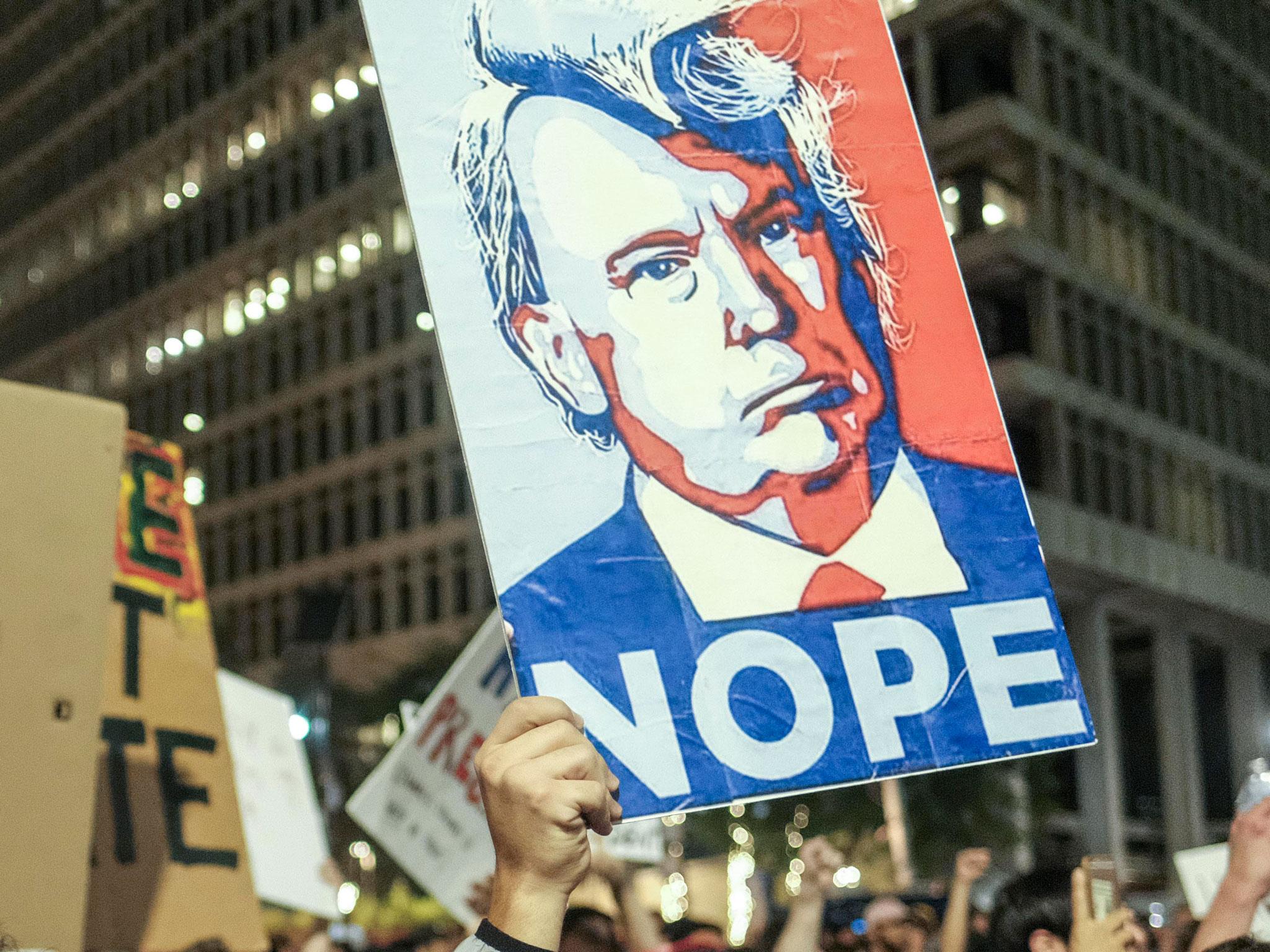5 ways you can protest Donald Trump's presidency
Trump is going to be president whether we like it or not – but that doesn't mean you have to sit down and be quiet

Donald Trump will enter the White House as perhaps the most disliked incoming president in modern US history.
Recent polls have shown that 40 per cent of Americans view how he has handled the transition favourably – a record low for a president in at least 40 years. To put it in perspective, Barack Obama took office in 2008 with an 80 per cent rating; Bill Clinton had 81 per cent; and George HW Bush took had an 83 per cent rating.
Even George W Bush, whose controversial election win sparked waves of protest, began his presidency at 71 per cent transition approval.
Trump’s transition has been riddled with scandal after scandal, including an alleged hacking effort by the Russian government to help him win the election. He ultimately did win electoral college, but failed to win the popular vote – trailing Hillary Clinton by nearly three million. Nevertheless, the popular vote does not necessarily determine who becomes the President.
But before all the geopolitical controversy, Trump prompted concerns that he would run his presidency as an authoritarian, his campaign promises to launch mass deportations, ban Muslim immigration, and his constant public vilification of the press.
Beyond the man, Trump’s rhetoric has galvanised white supremacist groups, and hate crimes have spiked since his election win.
Nothing is going to change the fact that Donald Trump is the 45th president of the United States, but that does not mean people who oppose the incoming regime have to sit down and say nothing.
So, what are some effective ways people can mobilise and protest the Donald Trump administration?
March
Hundreds of thousands of people are taking to the streets over inauguration weekend in cities across the US to make it known that the politics of Donald Trump will not stand.
Among the biggest marches in Washington on inauguration weekend is the Women’s March, which will see some 200,000 people in the district.
There will be countless opportunities to march with groups across the US. Search for your local Black Lives Matter chapter, reproductive rights groups, LGBTQ centres, immigrant rights coalitions, religious freedom groups, refugee organisations, or others to learn of planned actions.
Donate
Not everybody can make it to protests – whether they cannot take the time off work or have a disability that prevents them from standing in the cold weather for long stretches of time. Donations to nonprofit organisations to stand up against the new administration could also prove an effective defence against potential threats from Trump.
Such organisations include the NAACP, Planned Parenthood, the Southern Poverty Law Centre, Council on American-Islamic Relations, American Friends Service Committee's US-Mexico border programme, and nonprofit journalism organisations like The Centre for Investigative Reporting and ProPublica.
Participate in local government
President Obama issued a call to action in his farewell speech.
“If something needs fixing, then lace up your shoes and do some organising,” he said. “If you’re disappointed by your elected officials, grab a clipboard, get some signatures, and run for office yourself. Show up, dive in, stay at it.”
Most effective change will come from the bottom, at the local level, and up the ladder to state politics. Local participation could prove a valuable defence against racist voter suppression laws, such as the ones stricken down by a US court in North Carolina.
It’s a longer road, but voter restriction has been an ongoing problem in state and local governments for decades. Should a more diverse array of people engage in the political process, then perhaps it could lead to more fair voting laws in states like North Carolina and Florida – which were crucial in the election of Trump.
With the midterm elections on the horizon, there is no better time than now to start making phone calls and campaigning for progressive candidates for 2018.

Be an ally
Trump’s racist rhetoric throughout the campaign created a hostile environment for marginalised communities throughout the country. In fact, in the first 10 days after his election, the Southern Poverty Law Centre tallied nearly 900 instances of reported hate crimes and racist harassment.
Additionally, Trump’s win empowered white supremacist groups and hordes of racist, sexist internet trolls who target the LGBTQ community, people of colour, and women.
To protect marginalised people who will be affected the most by Trumpism, it is important for those who benefit from privilege – particularly heterosexual white people – to stand in solidarity with marginalised people.
Centre and listen to the voices of marginalised communities. Acknowledge and interrogate how institutionalised systems of oppression benefit you. Have difficult discussions with other white people – especially your family – and call out racism when it happens.
Educate yourself
Trump regularly spouts lies from his Twitter account, relying on the ignorance of others to create an alternate reality where he is always correct and always good. It is important to never take his comments at face value. If he insults a company or CEO, research those subjects before believing anything he says.
His promise to dismantle President Obama’s legacy during his first 100 days can be met with resistance if you research what those policies are, what he plans to do, and what steps he needs to take to implement his agenda – to repeal the Affordable Care Act, for instance.
The anti-racism, anti-police violence organisation, StayWoke, launched an extensive "Resistance Manual" to all of Trump’s policy proposals that includes countless reading materials about dissent, and resources that can be researched according to state.
Education, in and of itself, can be an act of resistance, and the beginning of a new progressive movement. And always remember, you are not alone.
Bookmark popover
Removed from bookmarks